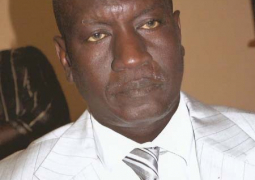The Special Criminal Court in Banjul presided over by Justice Amadi Monday freed one Yusupha Jarjue, accused of raping a four-year-old girl, for lack of evidence, particularly a DNA test to confirm that the sperm found on the victim was from the accused person.
Delivering his judgment, Justice Amadi said the accused was arraigned on a single-count charge of rape, which he denied.
The prosecution called three witnesses and tendered exhibits, including the medical report, birth certificate of the victim, and a letter from the Edward Francis Small Teaching Hospital indicating that they did not have the facilities to conduct a DNA test.
The victim said she was in her namesake’s house when the accused called her to the toilet, took her pants down and insert his penis into her vagina; then gave her D1 and asked her to go.
The victim was crying and going when she met with her mother.
PW2, the victim’s mother, said she met the victim crying and asked her why she was crying; if she had been beaten, and the victim told her that she was taken into the toilet by the accused, who pulled down her pants and inserted his penis in her vagina.
She said the victim said the one who raped her was hairy and wearing earrings.
PW2 said she took the victim to Fagikunda hospital where the doctor said sperm and blood was found on the girl and, after two days, the victim was taken back to Edward Francis Small Teaching Hospital.
PW2 further said they went to the accused’s house with the police; they asked the mother where the accused was, and she told them that the accused was not around.
The police searched the toilet, opened the first door and then opened the next door; they found the accused standing in the toilet.
PW2 said as soon as the accused was brought to the police station, the victim pointed at him, saying he was the one and his mother pleaded for the case to be withdrawn.
The evidence of PW3, one Dr. Mustapha Bittaye, a medical doctor at the EFSTH, was full of medical jargons and said he found out that the hymen was tampered with.
He said the report was not conclusive, because they did not know whose sperm it was, and that could only be ascertained through a DNA test.
The accused, in his defence, said he lives in Ebo Town and was mixing cement and water. Then went to the toilet to ease himself, when he was confronted by policemen who told him that he was needed at the station, where he was accused of dealing in drugs and raping a minor.
He stressed that he was wrongly accused, adding that he was seeing the girl for the first time at the station.
He said he did not know PW2, and that the victim did not point at him at the station.
According to Justice Amadi, PW2 said she and her husband took the police to the accused’s house and, when they searched for him, he was found in the toilet; whereas the accused said he was mixing cement and sand.
He said it was clear that neither the mother of the accused nor the accused knew the victim.
He said PW2 was in fact the one who identified the accused before he was taken to the station, and that there was no evidence that the accused, who was accused of rape, was hairy and wearing earrings.
“I therefore agree with the defence that the accused was arrested based on the identification of PW2, and the court should be mindful whenever there is an issue of identification or mistaken identity,” the judge said.
He also said PW2 said the doctor said he saw blood and sperm on the victim at the FagiKunda Health Centre, which should be ascertained by the said doctor because PW2 was incompetent to verify that.
He said the fact of the matter was that the report was not conclusive, because they could not carry out the DNA test.
He said the case was an unfortunate one; that it might be right or not right to overrule PW1’s testimony that she was sexually tampered, with and the medical science would have cleared the doubt if the DNA test had been conducted.
He said there was no evidence to prove beyond reasonable doubt that the accused committed the offence.
He also said the prosecution had failed to prove the case beyond reasonable doubt and, therefore, acquitted and discharged the accused person.




